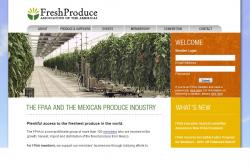FPAA Works To Change Imbalance Of Homeland Security
July 9, 2010 | 3 min to read

July 6, 2010. Nogales, Ariz—Residents across border communities were reeling after the White House announced a list of requested amendments for a FY 2010 Supplemental Appropriations Bill, amendments that drastically missed the mark on securing ports of entry across the border. Specifically, the White House requested funding for 1,000 Border Patrol Agents but only 30 Customs and Border Protection officers, the front line of security at the nation’s ports of entry.
The House of Representatives passed an amendment to the Supplemental Bill that would increase CBP officers by 500, a significant improvement over the request of 30. Now the Supplemental Bill returns to the Senate for a vote.
Members of the Fresh Produce Association of the Americas (FPAA) in Nogales, Arizona are working with partner organizations to change that imbalance in security spending and to educate the White House and Congress on the need to secure ports of entry, not just the areas between ports of entry. According to the FPAA, allocating resources to remedy the serious understaffing issues at the nation’s ports is a measure that will truly make steps to securing the border while helping boost the U.S. economy and saving tens of thousands of U.S. jobs.
“As Border Patrol staffing continues to increase at exponential rates while our ports are left understaffed, we will continue to see more and more criminals attempt to breach our ports of entry to smuggle drugs, guns, money, and people,” says Lance Jungmeyer, FPAA president. “CBP officers are a vital part of the multilayered security efforts along our border, and to continue to neglect that portion of Homeland Security will hamper vital trade and traveler flows while leaving our borders vulnerable.”
Estimates in this border community show that the ports of entry in Nogales alone currently need 100 additional CBP officers to fully staff the ports of entry, and the story is the same across many border communities. In addition to increasing security, staffing is especially critical in this border community given that Nogales is a major gateway for legitimate travelers that come to the U.S. to spend money and a gateway for the trade of over $22 billion in goods that are shipped between the U.S. and Mexico.
In fact, while Arizona faces mounting financial troubles, legitimate trade and travel are responsible for over 60,000 Arizona jobs. The produce industry alone imports over $2 billion worth of produce annually. Without adequate staffing at the ports to facilitate the north and southbound trade, the state’s economy will suffer even more financial blows.
“The President’s requested amendment was a devastating blow for border communities,” says Jungmeyer. “Fortunately, with all the attention on border security right now, there are positive signs from Congress that we could see as many as 500 CBP officers for the Southwest border this year.”
· Significant increases in CBP officers are needed just to address attrition due to retirement, transfers, resignations, and terminations in one year just for Arizona, much less for the entire U.S.
· It takes over a year to hire and fully train CBP officers. By October 2011, the Mariposa Port in Nogales will practically double in size, going from 4 commercial lanes to 8 and from 4 passenger lanes to 6, with an additional 6 passenger lanes, dedicated bus lanes, and pedestrian lanes by 2014. Mariposa currently processes 1,500 trucks daily during the peak produce season and will have the capacity to process 4,000 trucks in a day after expansion. Not only does CBP need officers now, they need officers to staff the newly reconfigured port.
· The number of Border Patrol agents has more than quintupled from 4,000 to a projected total of 22,800 in 2010. The agency's budget has exponentially increased over the same period from $400 million to $3.5 billion
· The budget for CBP officers has seen a relatively minimal boost. Funding for Customs increased from $1.6 billion in 1993 to $2.7 billion in 2010. Of that, 68 percent – nearly three quarters – was consumed by rising inflation
· This imbalance severely compromises our national and economic security.
Source: Fresh Produce Association of the Americas
